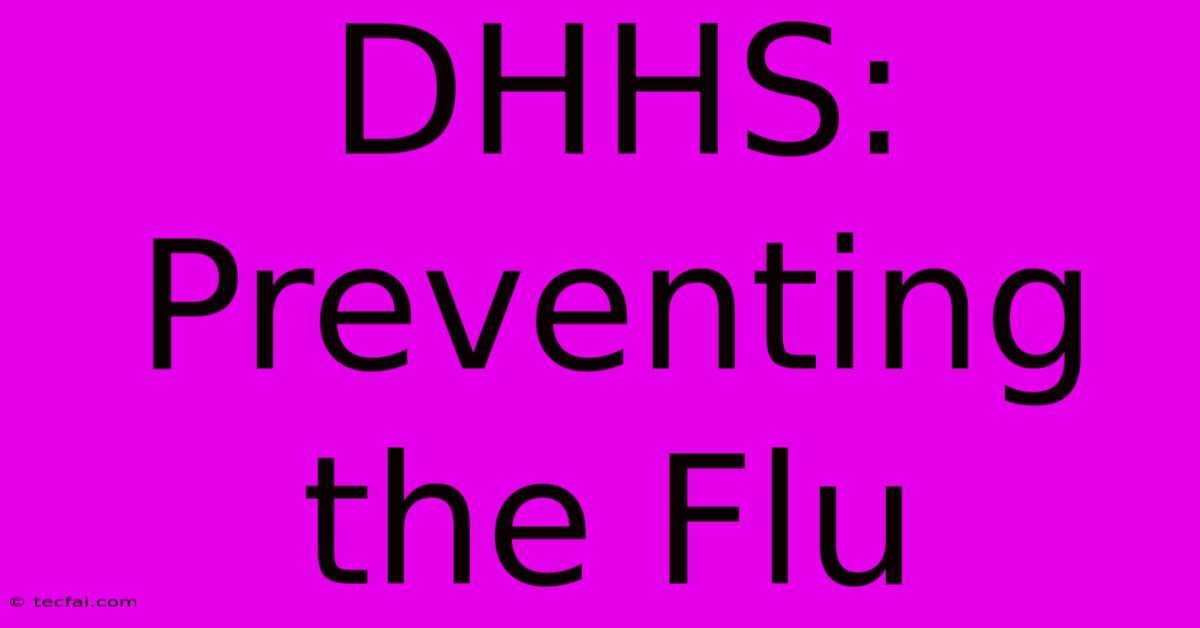DHHS: Preventing The Flu

Discover more detailed and exciting information on our website. Click the link below to start your adventure: Visit Best Website tecfai.com. Don't miss out!
Table of Contents
DHHS: Preventing the Flu – Your Guide to a Healthy Season
The Department of Health and Human Services (DHHS) plays a crucial role in protecting Americans from preventable diseases, and influenza (the flu) is a key focus. Every year, millions suffer from the flu, resulting in significant healthcare costs and lost productivity. Understanding how to prevent the flu is crucial for individual and community well-being. This guide provides a comprehensive overview of DHHS recommendations and strategies for staying healthy during flu season.
Understanding the Flu and DHHS's Role
The flu is a contagious respiratory illness caused by influenza viruses. These viruses spread easily through coughing, sneezing, and close contact. Symptoms can range from mild to severe and include fever, cough, sore throat, muscle aches, and fatigue. DHHS works tirelessly to mitigate the impact of the flu through various initiatives:
- Vaccination Campaigns: DHHS actively promotes and supports annual flu vaccination campaigns, emphasizing the importance of vaccination for all eligible individuals. They provide resources and guidance to healthcare providers and the public to ensure widespread access to vaccines.
- Public Health Surveillance: DHHS monitors flu activity across the nation, tracking outbreaks and assessing the severity of the season. This data is crucial for informing public health strategies and resource allocation.
- Research and Development: DHHS invests in research to develop new and improved flu vaccines, antiviral medications, and diagnostic tools. This ongoing research is vital for staying ahead of evolving influenza viruses.
- Community Outreach: DHHS engages in extensive community outreach programs to educate the public about flu prevention, symptoms, and treatment options. This includes disseminating information through various channels, such as websites, social media, and public service announcements.
Who Should Get the Flu Vaccine?
According to DHHS guidelines, the flu vaccine is recommended for most people six months of age and older. Especially important are those at high risk of complications, including:
- Young children: Children under five years old are particularly vulnerable to severe flu complications.
- Older adults: Seniors, especially those over 65, have a higher risk of hospitalization and death from the flu.
- Pregnant women: Pregnancy increases the risk of serious flu complications for both the mother and the baby.
- People with chronic health conditions: Individuals with asthma, heart disease, diabetes, lung disease, or weakened immune systems are at increased risk.
Key Strategies for Preventing the Flu (Beyond Vaccination)
While the flu vaccine is the single most effective way to prevent the flu, several additional strategies, endorsed by DHHS, can significantly reduce your risk:
Practice Good Hygiene:
- Frequent Handwashing: Wash your hands often with soap and water for at least 20 seconds, especially after coughing, sneezing, or touching public surfaces. Alcohol-based hand sanitizers are a good alternative when soap and water are unavailable.
- Cover Coughs and Sneezes: Cover your mouth and nose with a tissue or your elbow when you cough or sneeze. Properly dispose of used tissues immediately.
- Avoid Touching Your Face: Avoid touching your eyes, nose, and mouth, as this is a common way for viruses to enter your body.
Maintain Social Distancing:
During peak flu season, consider limiting close contact with people who are sick. Maintaining physical distance can help reduce the spread of the virus.
Stay Home When Sick:
If you are feeling unwell, stay home from work or school to avoid spreading the flu to others. Rest and allow your body to recover.
Clean and Disinfect Frequently Touched Surfaces:
Regularly cleaning and disinfecting frequently touched surfaces, such as doorknobs, light switches, and countertops, can help eliminate viruses.
Seeking Medical Attention
If you suspect you have the flu, it's important to seek medical attention, especially if your symptoms are severe or worsen. Your doctor can provide appropriate treatment, including antiviral medications which can lessen the severity and duration of illness.
By following the prevention strategies outlined by DHHS and practicing good hygiene, you can significantly reduce your risk of contracting and spreading the flu, protecting yourself and your community. Remember, staying informed and proactive is key to a healthy flu season.

Thank you for visiting our website wich cover about DHHS: Preventing The Flu. We hope the information provided has been useful to you. Feel free to contact us if you have any questions or need further assistance. See you next time and dont miss to bookmark.
Featured Posts
-
La Clippers Vs Boston Celtics Game 18
Nov 26, 2024
-
La Clippers Boston Celtics Injury Update
Nov 26, 2024
-
Expert Bayern Cl Predictions And Picks
Nov 26, 2024
-
Is Ladd Mc Conkey Out This Week
Nov 26, 2024
-
Flu Risk Factors New Cdc Report
Nov 26, 2024
